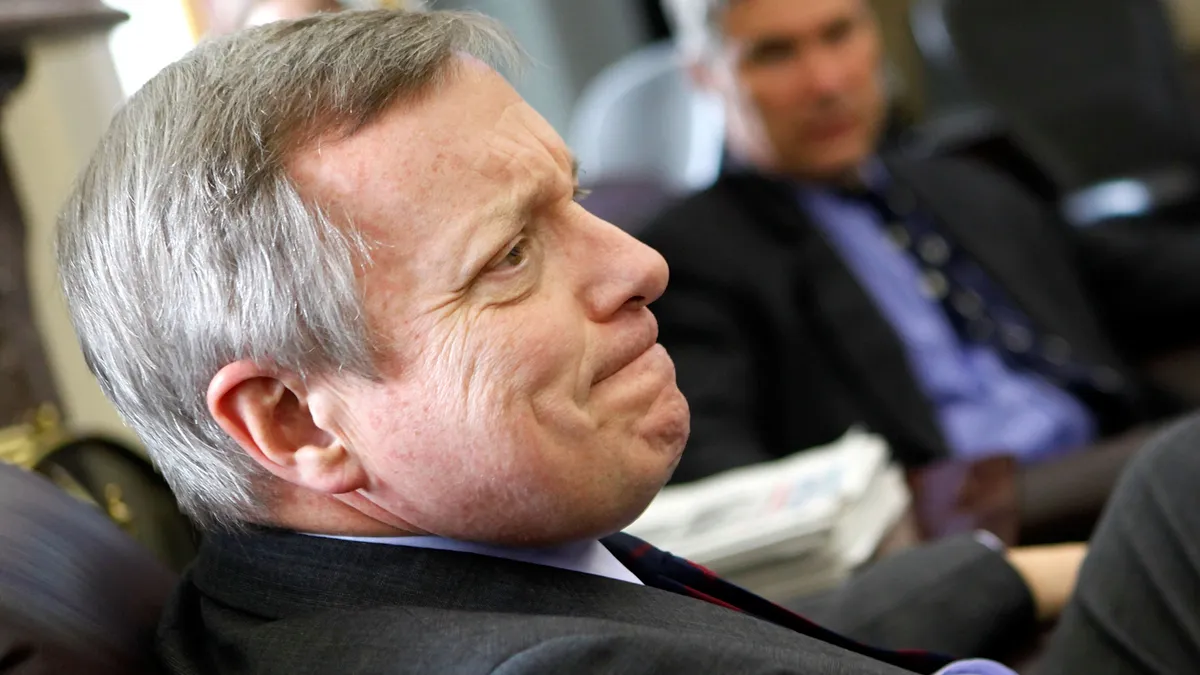Sen. Dick Durbin, who has long railed about antitrust issues in the card network industry, told the CEOs of Visa and Mastercard they should show up for an April congressional hearing, and not send subordinates.
In Monday letters to Visa CEO Ryan McInerney and Mastercard CEO Michael Miebach, Durbin issued a “formal invitation” to an April 9 Senate Judiciary Committee meeting that is scheduled to focus on “competition in the credit card market.” The Democrat from Illinois, who chairs that committee, said he felt compelled to write them personally because he understood that they had previously rejected invitations and alternatively offered to send lower-ranking company officials.
Visa had offered to send a senior adviser to McInerney, Bill Sheedy, to Washington for the hearing while Mastercard had said it would send Linda Kirkpatrick, president of Mastercard North America, according to the letters.
“I am writing to you directly because I understand that your staff have declined my prior requests for you to testify at this hearing,” Durbin said in the Feb. 12 letters to McInerney and Miebach.
Durbin, also a Senate majority whip, addressed similar letters to the CEOs of American Airlines and United Airlines, noting their companies’ use of branded credit cards. Those cards allow frequent fliers to collect awards through loyalty programs.
The letters castigated the companies for their opposition to Durbin’s proposed Credit Card Competition Act and their imposition of fees on merchants for consumers’ use of credit cards.
“You have aggressively opposed efforts to bring competition to the credit card market in order to protect the dominant market position you share with Mastercard,” the letter to McInerney said. A nearly identical letter to Miebach inserted Visa’s name at the end. The Democrat alleged in the letters that the networks and their allies have spent millions of dollars opposing the CCCA bill.
The legislation would require that the banks that issue credit cards ensure that there is an alternative card network, that’s not Visa or Mastercard, available for processing credit card transactions.
Durbin, and his Kansas Republican co-sponsor of the legislation, Roger Marshall, reintroduced the bill last year, after a predecessor bill failed to get traction in the prior congressional session in 2022. They were hopeful of attaching it to a bigger piece of legislation last year, but failed to make that happen, meaning they’re now facing the more difficult task of pushing for passage in a presidential election year.
A House companion bill has also attracted bipartisan sponsors, but like the Senate version, hasn’t drawn broad support among Congress members.
Durbin and Marshall have said the interchange and network fees associated with credit card use impose an unfair burden on merchants, especially small businesses, and on consumers. Durbin has sought for decades to weaken the dominance of Visa and Mastercard and in 2010 won passage of the Durbin Amendment to the Dodd-Frank Wall Street Reform and Consumer Protection Act that imposed new regulations on debit card transactions.
While retail industry groups, such as the National Retail Federation and the Merchants Payments Coalition, have supported the legislation, bank trade groups, such as the Electronic Payments Coalition, have opposed it. On Wednesday, the MPC touted the fact that two more senators, Josh Hawley, R-Mo., and Jack Reed, D-R.I., joined as co-sponsors of the legislation.
Durbin personalized most of the letters by reminding the CEOs of their specific comments bashing the legislation. Ultimately, his call to each was the same: “It is critical that the Committee, and the American people, hear directly from you in defense of a status quo that has allowed Visa and Mastercard to levy a total of $93 million in credit card fees on consumers, small businesses, and others in 2022 alone.”













